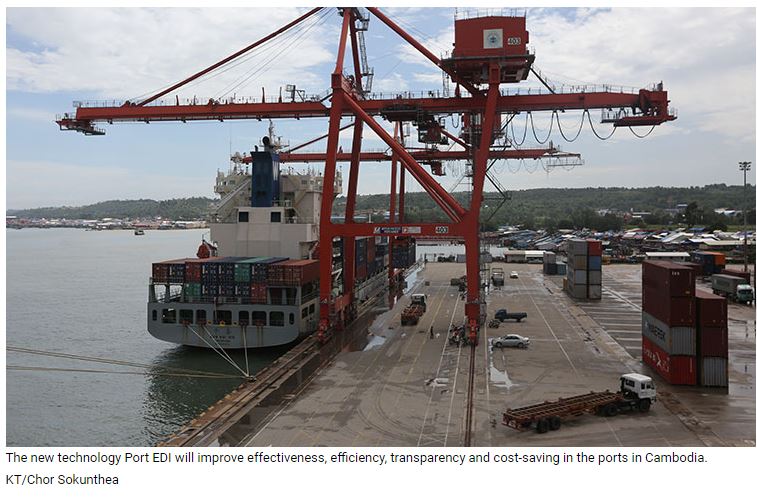Cambodia: No port congestion after Port EDI system launched
Japan-financed Port Electronic Data Interchange (Port EDI) system made a soft launch to put an end to paper-based procedures for private sector’s vessels entrance into and exit out of Sihanoukville Autonomous Port (PAS) and Phnom Penh Autonomous Port (PPAP) to improve effectiveness, efficiency, transparency and cost-saving.
The soft launch of Port EDI held at the Ministry of Public Works and Transport (MPWT) was attended by Sun Chanthol, Minister of MPWT, Japanese Ambassador to Cambodia Masahiro Mikami, Japan International Cooperation Agency (JICA) Chief Representative Kamei Haruko and about 200 officials from relevant MPWT ministries and institutions.
Chanthol said the Port EDI—the newly developed public service rendered by the government to the private sector—will make it easier for the private sector’s entrance and exit vessels in Cambodia by reducing complicatedness, paper-using and time in requesting vessel entrance and exit and improving effectiveness, efficiency and transparency.
“Previously, when vessels enter or exit in the country, all forms of requests were done by paper, which took so long time. So, they needed to wait at the ports for the result of the document reviewed by officials. Using this system, vessels will be able to fill in the forms online before coming to the port and after online submission, our relevant officials will conduct online review too,” Chanthol said.
“When vessels arrive, the goods can be loaded down and then they can leave immediately without waiting like for stamping and officials just click ‘ok’ along with digital signature and QR Code and the payment is made online without going to banks. So, this is the new achievement of the government where it is no longer needed to using paper,” he added.
There are about 6,000 foreign vessels entering and leaving sea and river ports annually in Cambodia, according to the figures of MPWT, adding that those vessels are required to go through manual and paper-based ship clearance formality procedures to enter and leave Cambodia, which was inefficient, time-consuming and port congestion.
Japanese Ambassador Mikami said he expects that the Port EDI system will support fostering logistics system in Cambodia, increasing the quantity of goods by more usage of the ports and developing domestic economy in the future, expanding the functions of PAS and PPAP to develop their competitiveness on the international market, which is really essential for smooth economic recovery after Covid-19 pandemic crisis.
“In this regard, the rarely-developed port electronic data interchange system will enable [vessel companies] to submit applications and notifications in relation to the entrance and leave of vessels via digital system and the ports themselves to be modernised in their names of international ports,” Mikami said.
He added that currently, the bilateral cooperation between Cambodia and Japan has been expanded to many sectors since a joint statement issued by Prime Minister Hun Sen and Japanese Prime Minister Fumio Kishida during the latter’s visit to Cambodia in March this year to acknowledge that the cooperation between Cambodia and Japan has reached the highest level in history.
The ambassador added that the joint statement points out that the two countries shall cooperate with each other at the maximum level to develop SHV port to become a major port for Cambodia and Mekong region and Japan has granted a $383.22 million loan to Cambodia to expand and modernise PAS through the exchange of notes signed by Prak Sokhonn, Minister of Foreign Affairs and International Cooperation, and Hayashi Yoshimasa, Foreign Minister of Japan early August this year.
Kamei Haruko, JICA Chief Representative in Cambodia, said that JICA and MPWT have been closely cooperating with each other on port administration in terms of strengthening the capacities of port officials to establish guidelines for the development of the port plan and port technical standards.
“I am confident that the system will contribute to the establishment of an efficient logistics system and modernisation of port administration as well as the development of the logistics system in the country,” she said.
Tat Sunhuot, Deputy Director General of General Department of Waterway and Maritime Transport and Ports of the MPWT, said the Port EDI has been managed by MPWT for implementation jointly by General Department of Customs and Excise (GDCE), General Department of Immigration of the Ministry of Interior, General Department of Health of the Ministry of Health, PAS and PPAP.
Cambodia entered into an agreement for a grant—over $12 million—on 20 February 2019 to implement Port EDI project, according to Sunhuot, adding that after the Japanese government approved the project.
Cambodia then signed another agreement with JICA to conduct financial management and project implementation monitoring on 26 February 2019.
Source: https://www.khmertimeskh.com/501134105/no-port-congestion-after-port-edi-system-launched/


 English
English




